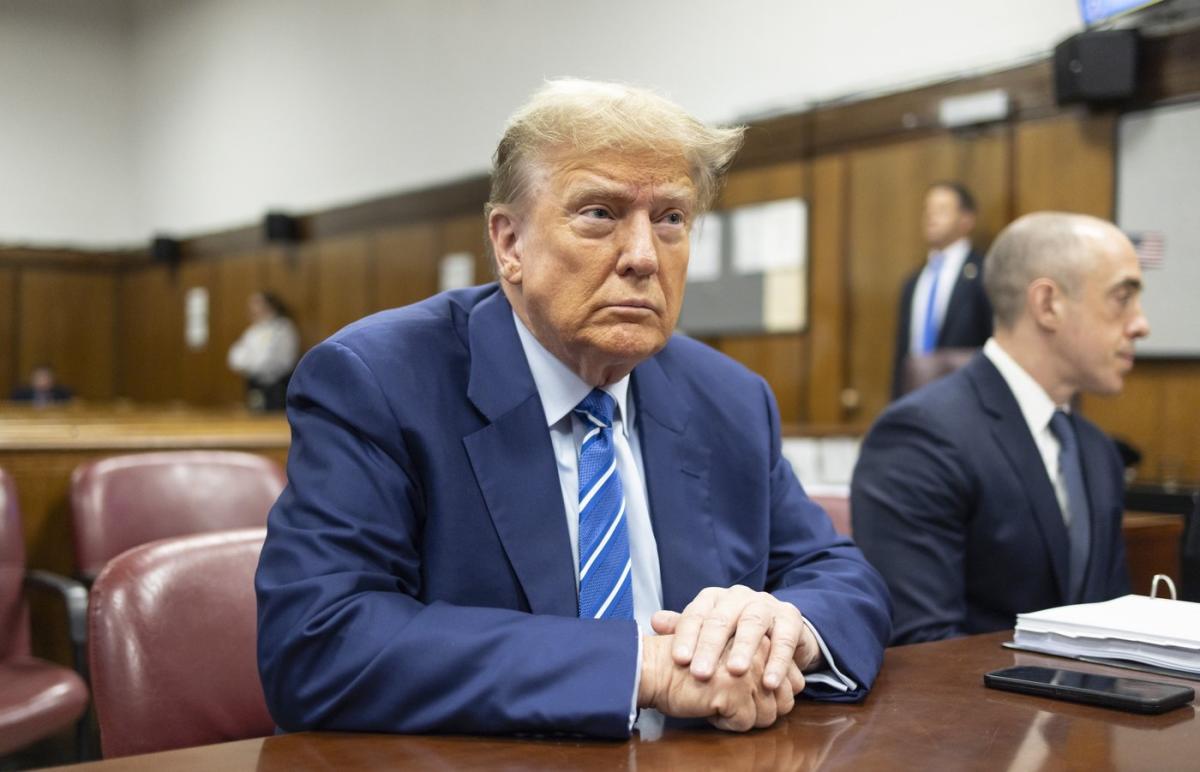NEW YORK (AP) — A federal judge on Tuesday swiftly rejected Donald Trump’s request to intervene in his New York hush money criminal case, thwarting the former president’s latest bid to overturn his felony conviction and delay his sentencing.
U.S. District Judge Alvin Hellerstein denied Trump’s lawyers permission to file paperwork asking the U.S. District Court in Manhattan to take control of the case. He said they had failed to satisfy the burden of proof required for a federal court to seize the case from the state court where Trump was convicted in May.
The ruling leaves Trump’s case in state court, where he is scheduled to be sentenced Sept. 18.
Trump’s lawyers had sought to move the case to federal court so they could then seek to have the verdict overturned and the case dismissed in the wake of the U.S. Supreme Court’s ruling granting ex-presidents immunity from prosecution for official acts.
Hellerstein, who denied Trump’s request last year to move the case to federal court, said nothing about the Supreme Court’s July 1 ruling affected his “previous conclusion that the hush money payments” at issue in Trump’s case “were private, unofficial acts, outside the bounds of executive authority.”
Hellerstein sidestepped a defense argument that Trump had been the victim of “bias, conflicts of interest, and appearances of impropriety” at the hands of the judge who presided over the trial in state court, Juan M. Merchan.
“This Court does not have jurisdiction to hear Mr. Trump’s arguments concerning the propriety of the New York trial,” Hellerstein wrote in a four-page decision.
Instead, Hellerstein noted, Trump can pursue a state appeal or, after exhausting that path, seek review from the U.S. Supreme Court
“It would be highly improper for this Court to evaluate the issues of bias, unfairness or error in the state trial,” Hellerstein wrote. “Those are issues for the state appellate courts.”
Hellerstein’s ruling came hours after Trump’s lawyers filed paperwork seeking his permission to pursue federal court intervention. Trump’s lawyers had initially asked the federal court to step in last week, but their papers were rejected because they hadn’t first obtained Hellerstein’s permission to file them, as required.
Messages seeking comment were left with Trump’s lawyers and the Manhattan district attorney’s office, which prosecuted the case.
Earlier in the day Tuesday, Manhattan prosecutors raised objections to Trump ‘s effort to delay post-trial decisions in the case while he sought to have the federal court step in.
The Manhattan district attorney’s office argued in a letter to the judge presiding over the case in state court that he had no legal obligation to hold off on post-trial decisions and wait for Hellerstein to rule.
Prosecutors urged the trial judge, Juan M. Merchan, not to delay his rulings on two key defense requests: Trump’s call to delay sentencing until after the November election, and his bid to overturn the verdict and dismiss the case in the wake of the U.S. Supreme Court’s presidential immunity ruling.
Merchan has said he will rule Sept. 16 on Trump’s motion to overturn the verdict. His decision on delaying sentencing has been expected in the coming days.
Trump was convicted in May of 34 felony counts of falsifying business records to conceal a $130,000 hush money payment to porn actor Stormy Daniels, whose affair allegations threatened to disrupt his 2016 presidential run. Trump has denied her claim and said he did nothing wrong.
Falsifying business records is punishable by up to four years behind bars. Other potential sentences include probation or a fine.
In a letter Tuesday, Assistant District Attorney Matthew Colangelo reiterated that prosecutors have not staked a position on whether to delay sentencing, deferring to Merchan on an “appropriate post-trial schedule.”
Trump’s lawyers have argued that sentencing Trump as scheduled, just two days after Merchan’s expected immunity decision, would not give him enough time to weigh the next steps — including a possible appeal — if Merchan rules to uphold the verdict.
They also argued that sentencing Trump on Sept. 18, about seven weeks before Election Day would be election interference, raising the specter that Trump could be sent to jail as early voting is getting underway.
Colangelo said Tuesday that prosecutors were open to a schedule that allows “adequate time” to adjudicate Trump’s motion to set aside the verdict while also sentencing him “without unreasonable delay.”
In a letter to Merchan last week, Trump’s lawyers said delaying the proceedings is the “only appropriate course” as they seek to have the federal court rectify a verdict they say was tainted by violations of the Republican presidential nominee’s constitutional rights and the Supreme Court’s ruling that gives ex-presidents broad protections from prosecution.
The Supreme Court’s immunity ruling reins in prosecutions of ex-presidents for official acts and restricts prosecutors in pointing to official acts as evidence that a president’s unofficial actions were illegal.
Trump’s lawyers have argued that prosecutors rushed to trial instead of waiting for the Supreme Court’s presidential immunity decision, and that prosecutors erred by showing jurors evidence that should not have been allowed under the ruling, such as former White House staffers describing how Trump reacted to news coverage of the hush money deal and tweets he sent while president in 2018.
Trump’s lawyers had previously invoked presidential immunity in a failed bid last year to get the hush money case moved from state court to federal court.
Michael R. Sisak, The Associated Press

